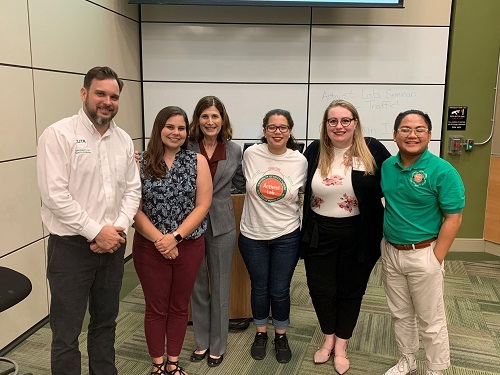Teaching advocacy via the Activist Lab
First published on October 7, 2019 in observance of the COPH’s 35th anniversary celebration.
Advocacy is as important in public health as data analyses and needs’ assessments.
But students have traditionally lacked advocacy experience.
In 2018, Dr. Karen Liller, a USF College of Public Health (COPH) professor specializing in injury prevention and health education, decided to remedy that situation by starting the Activist Lab at the COPH.
The group, which is run with the help of two research assistants and a six-student advisory board made up of graduate and undergraduate students, provides interdisciplinary advocacy, education, research and service opportunities for students to develop the skills that will promote their success as effective public health advocates and leaders.

The Activist Lab, directed by Liller, is the second such lab in the country, with the first being at Boston University’s School of Public Health.
Liller says she had been wanting to start a program like the Activist Lab at the COPH for a while, to compliment the Doctoral Student Leadership Institute she began as dean of the USF Graduate School, now known as the Office of Graduate Studies.
“I strongly believed students needed much more preparation in leadership and advocacy skills before they graduated,” Liller commented.
In just one year of its existence, hundreds of students have taken part in the Activist Lab’s educational and service opportunities, which include activism boot camps, seminars, guest speakers, journal clubs, writing groups, research efforts and public health in a minute videos. These videos—only 60 seconds long—have featured faculty and community leaders discussing pertinent public health issues, everything from the importance of voting to refugee health.
According to Liller, some of the Activist Lab’s first-year highlights include:
- work with Dr. Mark Roberts and other University of Pittsburgh researchers on a measles simulator for Florida (called FRED Florida Measles Simulator), which shows how cases of the viral infection can grow in an area with just a 10 percent drop in immunizations
- a gun violence prevention and advocacy seminar, held in partnership with USF Health and led by Parkland shooting survivors David Hogg and Emma González

Things won’t slow down for the Activist Lab anytime soon. In addition to the continuation of seminars, speakers and learning opportunities, the organization has the following things planned for the future:
- a boot camp on the prevention of firearm violence, scheduled for January
- a new program called “More Opportunities to Use Learned Advocacy” (MOULA), where students work with particular agencies, such as Moms Demand Action and the Guardian ad Litem program, on advocacy issues
- the launch of a new podcast series called “Advocation—Change It Up!” The first podcast features Dr. Jill Roberts, a COPH alumna and assistant professor of global health, discussing the importance of immunizations.
- an oral presentation on activism, to be delivered at the 2019 American Public Health Association (APHA) meeting in November
The Activist Lab serves as an exciting hub of learning and action for students to become directly involved in practicing leadership and advocacy skills, says Liller, who sees the lab’s numbers growing and its reach expanding beyond the college and university to the state, nation and world.
“For example, with our podcast new persons will be reached and advocacy skills can be expanded and practiced,” remarked Liller. “Students can become part of our advisory board and really help shape the direction of the lab. They can participate in all of our events, and as we grow more and more opportunities will become available.”
Story by Donna Campisano, USF College of Public Health
